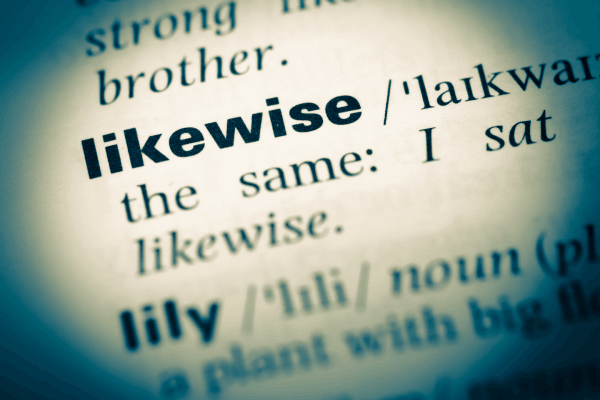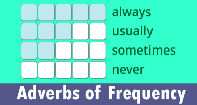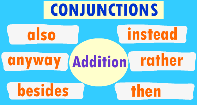Change Avatar
Adverbs of Conjunction
Adverb of Conjuction

Adverbs of conjunction join two independent clauses or sentences together by emphasizing the verb. They are often used to show addition or comparison, to indicate a consequence, to show contrast or emphasis, to show cause and effect, or to clarify.
Adverbs of conjunction typically use two forms of punctuation:
period + adverb + comma
It was hot. Nevertheless, we still went for a run.
Semicolon (;) + adverb + comma
It was hot; nevertheless, we still went for a run
Here are some examples:
| NEVERTHELESS | I hate snakes; nevertheless, I took my niece in the reptile booth. |
| STILL | It was getting late; still, we sat on the porch and waited. |
| THEN | If she wants to swim, then she had better wear her bathing suit. |
Remember that these can also serve as subordinating conjunctions, but you can tell an adverb of conjunction because it can move positions within a sentence.
Examples: Adverb of conjunction
We went to the park; however, we were unable to stay long.
We went to the park; we were however unable to stay long.
We went to the park; however, we were unable to stay long.
Subordinating conjunction However you decide to vote, there will be a winner tomorrow.
Here is a list of common Adverbs of Conjunction and their meanings:
| ADVERB OF CONJUNCTION | EXAMPLE |
|---|---|
| also | Mary loved to eat doughnuts; also, she loved to bake them. |
| again | She had again fallen down the stairs. |
| anyway | It was raining; we decided to go to the library anyway. |
| besides | We missed the movie; besides, I’m too tired to watch. |
| consequently | I forgot to bring money. Consequently, I didn’t get snacks. |
| for example | The park has lots of things for kids; for example, there are four playgrounds. |
| furthermore | We are running out of time and money; furthermore, all support has ended. |
| however | I wanted to go first; however, I let my brother ahead of me. |
| In fact | She seems guilty. In fact, I saw her snooping around earlier. |
| instead | I’m tired of pizza. Let’s have burgers instead. |
| likewise | My grandparents wanted their kids to succeed; likewise, they also wanted the same for their grandchildren. |
| meanwhile | The bunny was eating a carrot; meanwhile, the fox was watching the bunny. |
| nevertheless | Time is almost up; nevertheless, they continued digging. |
| otherwise | We’ve got to go; otherwise, we’ll be late for the party. |
| rather | Let’s not finish this now; rather, let’s start again in the morning. |
| subsequently | She failed her exam; subsequently, she did not graduate. |
| then | I mowed the lawn first. Then, I did the trim. |
| therefore | I’ve succeeded in the experiment; therefore, I have proven my hypothesis. |
| thus | We were willing to wait; thus, we got tickets first. |
Similar Games










